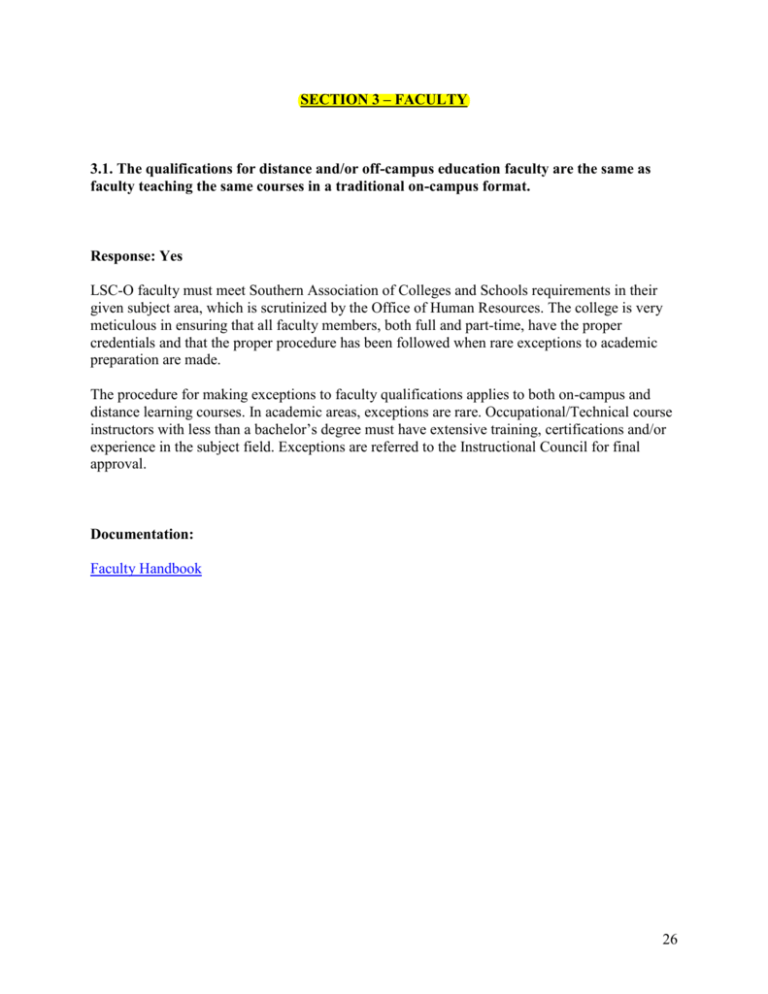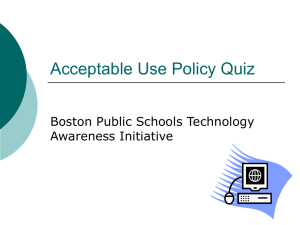SWOT Analysis of Distance Education at LSC-O
advertisement

SECTION 3 – FACULTY 3.1. The qualifications for distance and/or off-campus education faculty are the same as faculty teaching the same courses in a traditional on-campus format. Response: Yes LSC-O faculty must meet Southern Association of Colleges and Schools requirements in their given subject area, which is scrutinized by the Office of Human Resources. The college is very meticulous in ensuring that all faculty members, both full and part-time, have the proper credentials and that the proper procedure has been followed when rare exceptions to academic preparation are made. The procedure for making exceptions to faculty qualifications applies to both on-campus and distance learning courses. In academic areas, exceptions are rare. Occupational/Technical course instructors with less than a bachelor’s degree must have extensive training, certifications and/or experience in the subject field. Exceptions are referred to the Instructional Council for final approval. Documentation: Faculty Handbook 26 3.2. The institution provides orientation, training, and support services for faculty involved in distance education and off-campus programs. Response: Yes The Instructional Designer provides all the necessary training and professional development opportunities for instructors to ensure that the instructors are comfortable in the online teaching environment. The focus is on faculty support involving WebCT designer training, software tutorials, and on online pedagogy. The training is in the form of workshops for a hands-on training. It is also available online for those who have time constraints and hence are unable to attend the workshops or just want some refresher lessons. The Instructional Designer also provides individual consultations for those interested. Plans are afoot to have a well designed Distance Education website with more resources for both faculty and students. The college also has a Help Desk that provides support to faculty and students with log-in and other technical issues. Documentation: 27 3.3. Procedures are in place for appropriate evaluation of faculty involved in the distance and/or off-campus education program (such as procedures that evaluate faculty-student interaction). Response: Compliance Faculty members that teach online courses also teach traditional courses and are evaluated using the similar instruments. The Dean of Instruction and Division Directors are provided copies of the appropriate data from the “Student Evaluation of Online Course,” and grade analyses for use in evaluation activities. This year due to Hurricane Ike and the resulting devastation, we could not get student evaluations completed. Documentation: 28 3.4. Faculty have a role in development and evaluation of courses. Response: Yes LSC-O faculty are highly involved in the development and evaluation of courses. They go through a year long process of designing and developing their online course, simultaneously getting technical training through workshops and individual consultations with the Instructional Designer. The courses are evaluated by the distance education committee. The “Online Course Development Procedure”, is published in the Distance Education at LSC-O handbook, and outlines the process. Documentation: Developing a Distance Education Course (Appendix F: DE Handbook - Section 2) 29 3.5. A policy exists that addresses faculty teaching load for those involved in distance and/or off-campus education. Response: Yes Faculty members are not required to develop or teach a distance education course; however, fulltime faculty, administrators, staff, and part-time faculty are eligible to propose a course/program for development and delivery via a distance education medium. Remuneration for course development is based on the formula of “course credit hour equivalency.” Developmental rate for publisher-developed courses are paid one-half of the course credit-hour equivalency. Payment for credit course delivery will be based on the formula of “faculty course load + 1 credit hour” for first-time delivery of an online course (fully online or a hybrid). Subsequent semesters and courses are paid as regular faculty course load. Distance Education course development pay is not paid as part of base pay but only as an overload. Payment is made upon the successful completion of development based upon the required standards. Documentation: Distance Education Instructional Policies (Appendix G: DE Handbook - Section 4) 30 3.6. A process exists for evaluating the credentials of faculty employed by other institutions who are teaching courses for which your institution is awarding credit. Response: Yes We have faculty that teach for us and for other institutions. The process of evaluating their credentials is the same as for our regular faculty members. Documentation: Faculty Handbook 31 3.7. The institution has policies on intellectual property, faculty compensation, copyright guidelines, and the distribution of revenue (if applicable) that are appropriate for distance and/or off-campus education. Response: Yes LSC-O has developed policies for the development of distance education courses. These policies address intellectual property, compensation for course development, licensing rights and revenue distribution. Documentation: Distance Education Instructional Policies (Appendix G: DE Handbook - Section 4) 32






